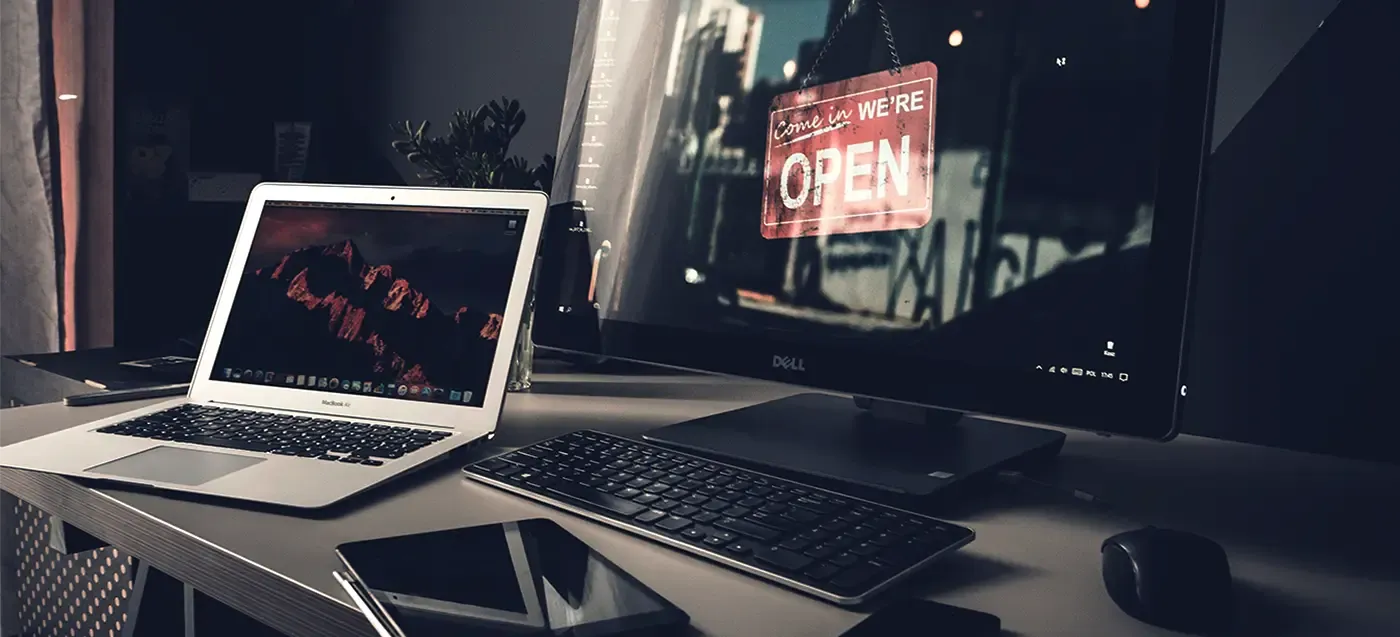
Laptop vs. Desktop: Which Is Best?
Has the time come to finally replace your computer? Or are you simply looking for a change in your setup?
The answer to the Laptop vs. Desktop debate, in general, is: “It depends.”
For a college student, for example, the importance of a laptop’s mobility far exceeds the sturdiness and power capability of a desktop computer. Whereas for a video producer, the reliability of a desktop computer might just make more sense.
But what about for you, a business-owner?
Let’s dig deep into the pros and cons of each. At the end of it all, the decision might be easier than you thought.
Laptop pros: It’s all about mobility and ease of use
If you put a laptop and a desktop computer side by side who both have the same exact specs, power, and performance capabilities, the laptop will typically be more expensive. The laptop makes all of those awesome specs more mobile! With a laptop, you pay more for convenience and portability.
Mobility: This is really the appeal of a laptop. Laptop computers are designed to move around and be used on the go. If you travel a lot, especially for business, you may have no choice but to go with a laptop, but don’t be surprised to discover you may need to pay at least $1,000 to get the exact specifications you’re looking for.
Power usage: Think about it--smaller parts means a smaller amount of power to make them work. This makes a laptop much more power-friendly than a desktop computer. And, because laptop computers have a separate battery, you won’t have to worry about losing your progress or documents when the electric goes out in a thunderstorm. Laptop computers also typically consume 80% less electricity than their home-ridden counterparts.
Ease of use: Setting up and getting started on a laptop computer is much easier than on a desktop--just open the box, take it out, and turn it on. In most cases, it won’t even need to be charged first.
Laptop cons: The cost and repairs might not make sense
In a sense, the laptop’s cons come from its pros. Having your computer as a one-piece unit makes it more portable, yes, but it also makes it much more difficult and costly to repair.
Cost: Laptops simply aren’t comparable to desktop computers when it comes to the price vs. performance ratio. In general, the standard laptop computer is more limited than the standard desktop computer, so bumping up the speed, graphics, storage, etc. is going to cost you. A gaming laptop, for example, would cost you much, much more than a similar-performing desktop unit, simply because laptop processing isn’t quite there yet.
Upgrades: Most components in a laptop computer are built in and therefore not removable. So, anything outside of memory, operating system, and your hard drive typically won’t be able to upgrade. If you ever need to upgrade anything else, you just might need to purchase a new laptop instead.
Repairs: This brings us to repairs. Repairing your laptop usually means needing to replace a part, and dealing with replacement laptop parts is no easy maneuver--it often involves searching online, and maybe sending your computer away to be taken apart and then put back together. It’s highly unlikely that you’d find replacement laptop parts sitting on the shelf at your nearest tech store, too. The older the laptop, the more difficult it is to find reputable parts, since many manufacturers don’t provide “vintage” models of their parts.
Desktop pros: Reliable power and durability
For anyone concerned about price, and for anyone who doesn’t need portability, a desktop computer is probably the best option. Compared to laptop computers of similar performance, desktop computers are simply the better value.
Cost: If you want to spend $800, or even $2000 on your new computer, you will get much more bang for your buck if you opt for a desktop model. Since everything doesn’t need to be squeezed into a laptop, size isn’t factored into cost as much.
Accessories and customization: With a desktop computer, if you don’t like the keyboard, monitor, or mouse that comes along with it, that’s fine! The options are endless--bluetooth keyboard, ergonomic mouse, detachable number pad, the list goes on. This goes for inside the computer as well. You can swap out many different parts within a desktop computer without compromising its performance or appearance, which makes upgrading parts easy as well.
Repairs: You can find replacement parts for your desktop computer just about anywhere computers are sold, whether in store or online. And these computer parts can be easily replaced without affecting the whole unit.
Processing: Compared to laptops, desktop computers overall have much more processing power, and with more customizable options to choose from. As we said earlier, laptops aren’t really “there” yet. For example, desktop computers are capable of working with high-powered graphics cards that have higher requirements, and a desktop computer could even use more than one at the same time with no issues.
Desktop cons: Not efficient, not portable
If you’re worried about efficiency when it comes to electricity and power-saving, a desktop computer may not be the right choice for you.
Power usage: In order for a desktop computer to run, it needs a lot of power. The monitor, the power supply, and all of the little components inside your computer tower need much more power than a laptop does. Plus, if your electricity goes out, for example, you could very well lose everything you were working on, since your desktop computer will shut down unpredictably when the power goes out.
Portability: Since your desktop computer has many more components than just the tower (think of the keyboard, mouse, monitor), it is not travel-friendly. You can pretty much guarantee that your desktop computer will stay in one spot for as long as you own it, so you need to be prepared ahead of time to accommodate for any sudden travel needs. Plus, constantly moving your desktop computer around poses many risks for the parts inside the tower, which are much more sensitive than a laptop.

Is the choice clear?
It all comes down to this:
Is portability important to you? If yes, you might be better off with a laptop.
Is cost more important to you than portability? If yes, you might be better off with a desktop.
Ultimately, your decision depends on your needs and what’s most important in terms of your own productivity.
Considering going with a desktop computer? If so, you can read more about how Oeveo provides ergonomic environments for your workplace by mounting your computer. Mounting your desktop computer can extend its life, and can make for a happier, more productive workspace.
Let Oeveo take care of all of your computer mounting needs. A more efficient workspace is just a few clicks away!